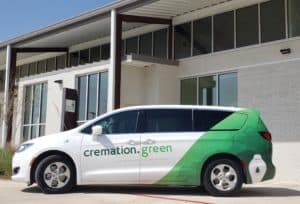After a cremation, families typically do one of three things: they bury the remains, scatter them or store them in an urn either at home or in a columbarium. But those aren’t the only options. And there’s one option that many people choose yet few people talk about.
You may be surprised to learn that many families do not want to receive the remains after the cremation. That’s the case for one percent of all cremations (approximately 15,000+ per year). But the process isn’t complete when the cremation is done. Something has to be done with the remains.
That’s what we’re taking a closer look at in this post. We’re answering questions about what happens when a family or loved one doesn’t take ownership of the remains after the cremation.
Why Families Don’t Receive the Remains
We all grieve and recover from loss in our own way. For some people, having a constant reminder is just too much to bear. So the idea of keeping the remains can make them feel uneasy. It’s just one reason why a family member may choose to let the funeral home handle the storage or disposal.
Some families choose to have a memorial and viewing before the cremation. They feel like this is the closure that they need and receiving the remains will just start the process all over again.
There are also cases where the surviving relative wasn’t very close with the deceased and doesn’t know what to do with the remains. The exact opposite could also be true. You could be very close to the deceased but if their will said they wanted the funeral home to dispose of their remains then there’s not much anyone can do about it.
How to Specify That You Don’t Want the Remains
When you arrange cremation services the crematorium will likely ask you what you’d like to have happen with the remains after the cremation. It may even be part of the cremation forms. Most of the time the funeral home needs you to specify whether you plan to pick up the remains or want to have them delivered, but you can also request that the funeral home dispose of the cremated remains for you.
Of course, some people simply don’t show up to pick up the cremated remains. There is no rule or regulation that states the remains must be claimed. If this is the case, the funeral home will make numerous attempts to contact the family before anything happens to the remains.
What Happens to the Remains If You Don’t Get Them
No funeral home likes to dispose of the remains for a family, but many will handle the disposal if necessary. Funeral directors understand that it’s a personal choice, and that’s what matters most.
The question remains, what happens to the remains if the family chooses not to take them after the cremation? Initially, cremated remains are stored by the funeral home or crematorium. Usually remains are put in a temporary storage container that’s large enough to hold 200 cubic inches (the average amount of cremated remains). The remains are kept out of public view in a secure area.
But the remains can’t stay there indefinitely. One way or another the funeral home will have to do something with them.
Even though remains are simply the remaining bones left over after cremation that have been crushed into a powder there are guidelines that must be followed for disposal. This is true for families that choose to receive the remains and funeral homes that have to handle unclaimed remains.
What has to be done legally will be different from state to state. In Texas, funeral homes must hold on to the remains for at least 121 days. Most of the time unclaimed ashes are scattered. But the funeral home has to get approval for the scattering just like the family would.
Other funeral homes will bury the remains. They’ll usually wait until there are a certain number of remains then bury them together in a mass grave.
No matter what the funeral home or crematorium does with the remains, they should keep a detailed record of how they were handled. This is done just in case a family member inquires about what happened to the remains.
At Green Cremation Texas we will keep the remains for up to 6 months. This gives our families plenty of time to decide whether or not they really want to have us dispose of the remains.
If you have additional questions about options for handling the remains after a cremation, give us a call, text or email.






